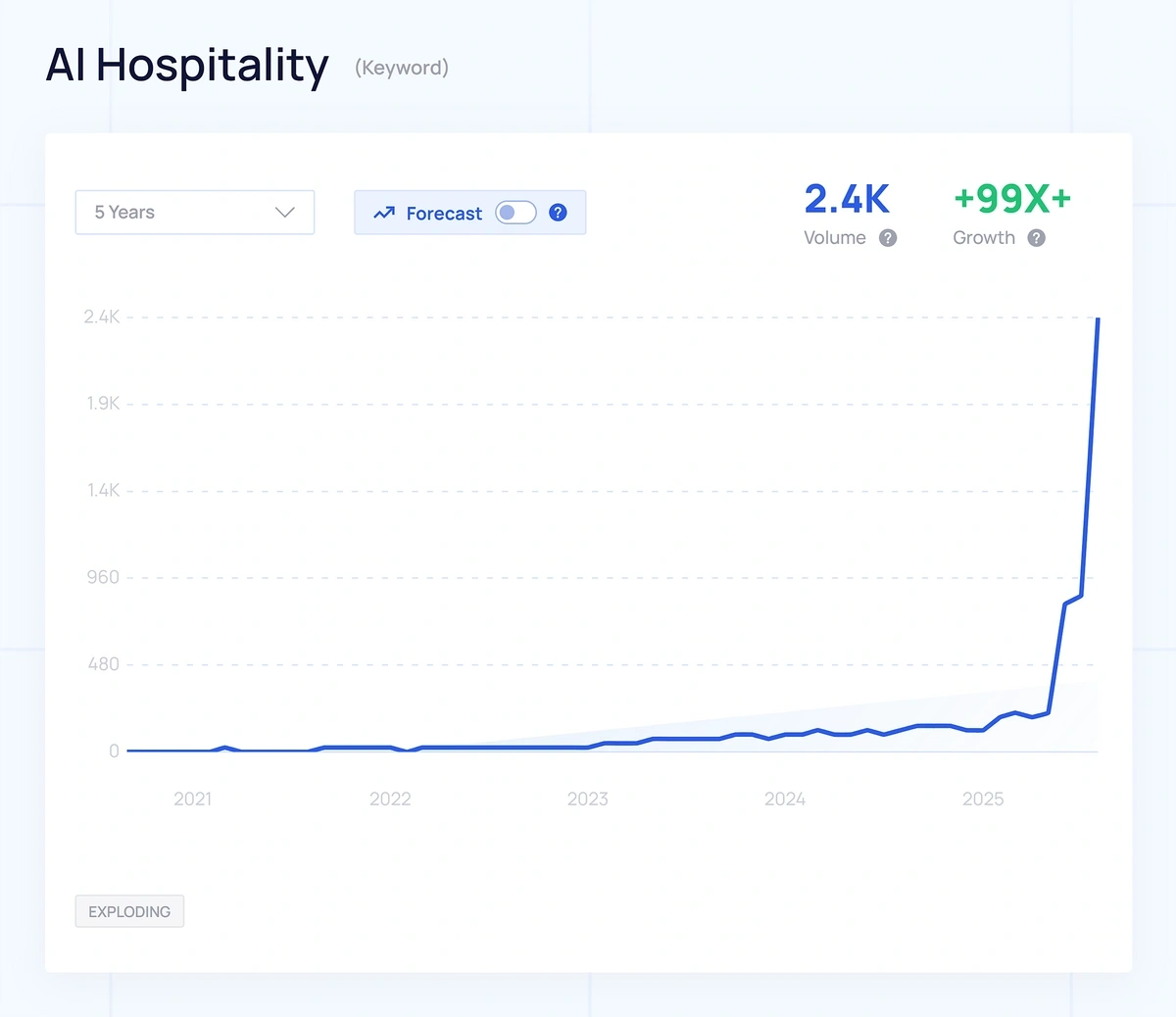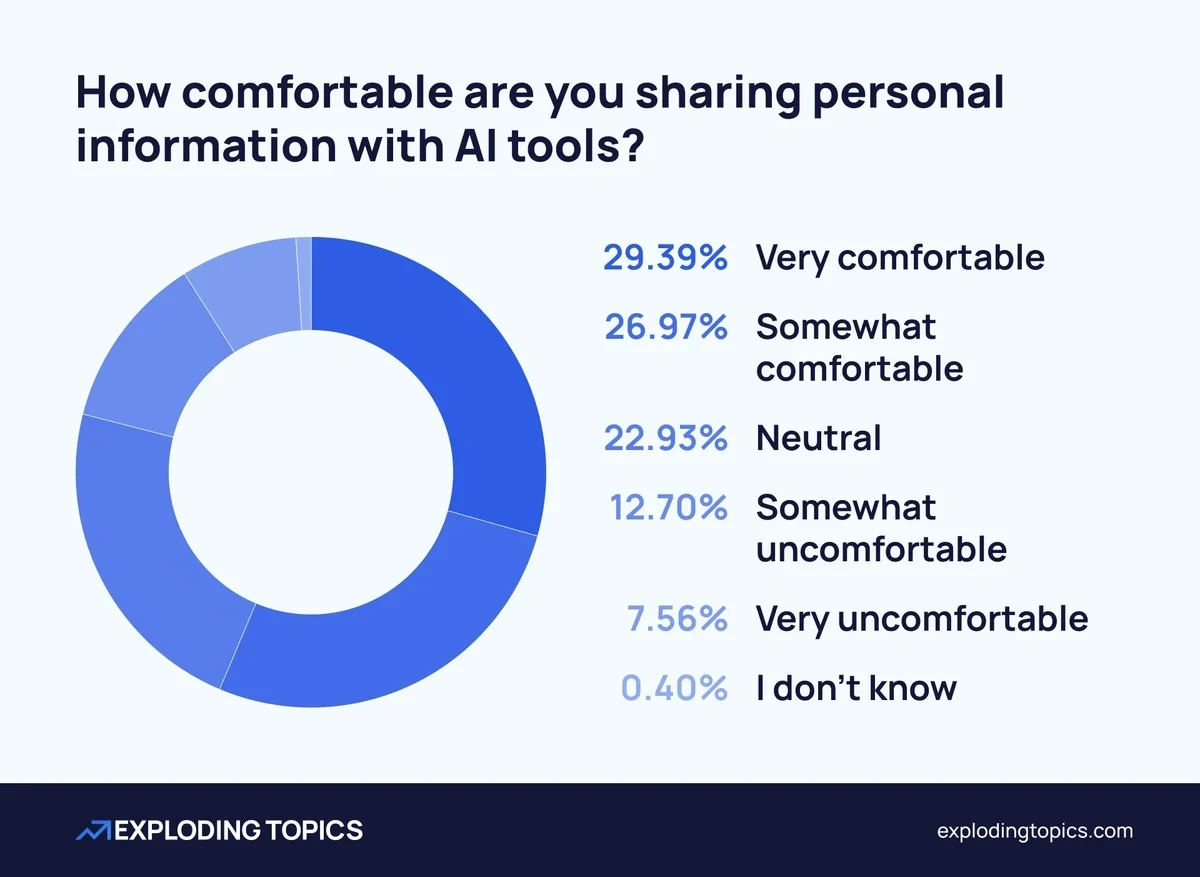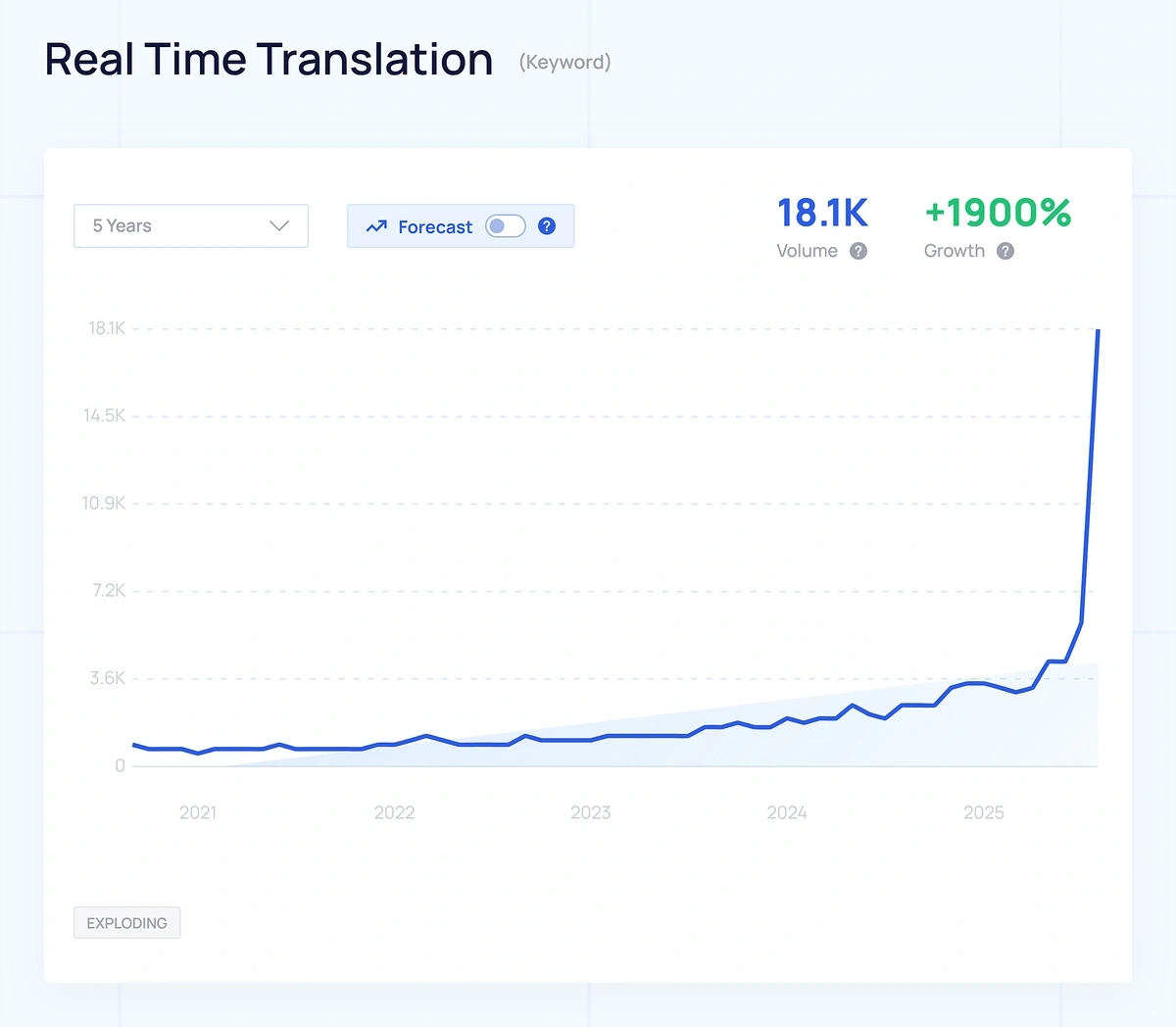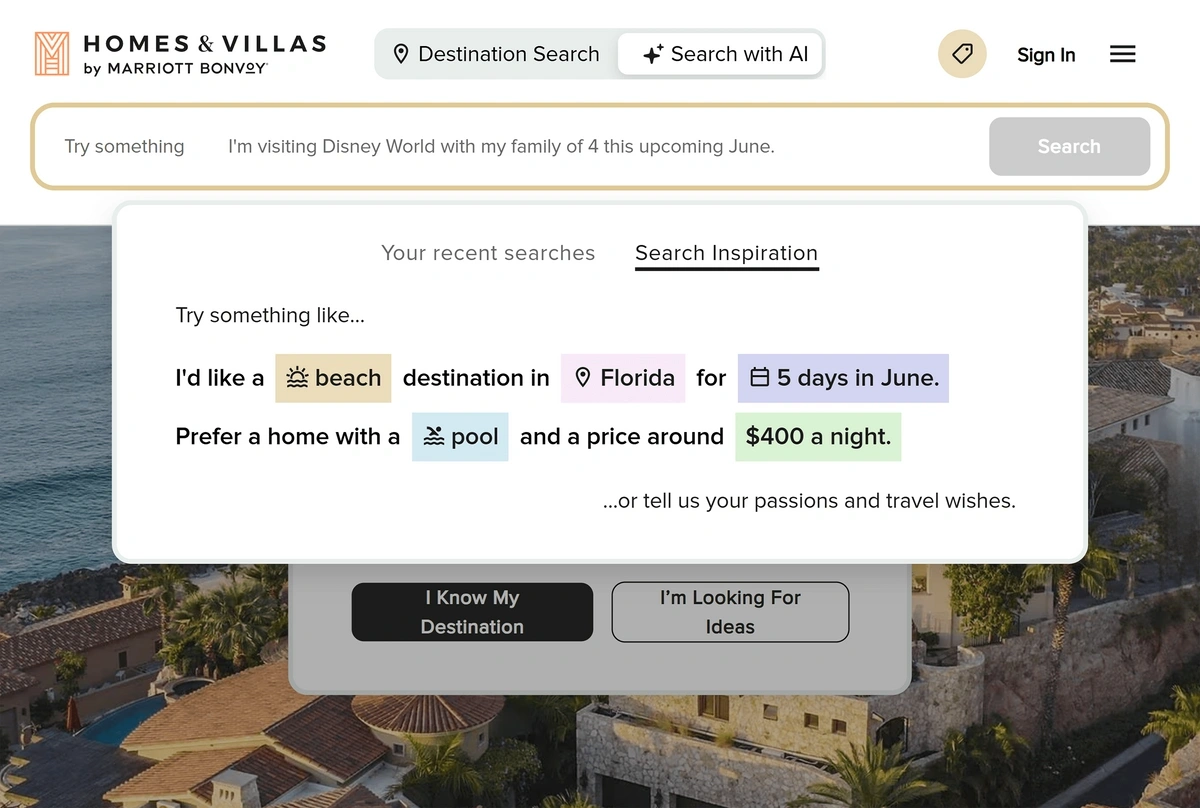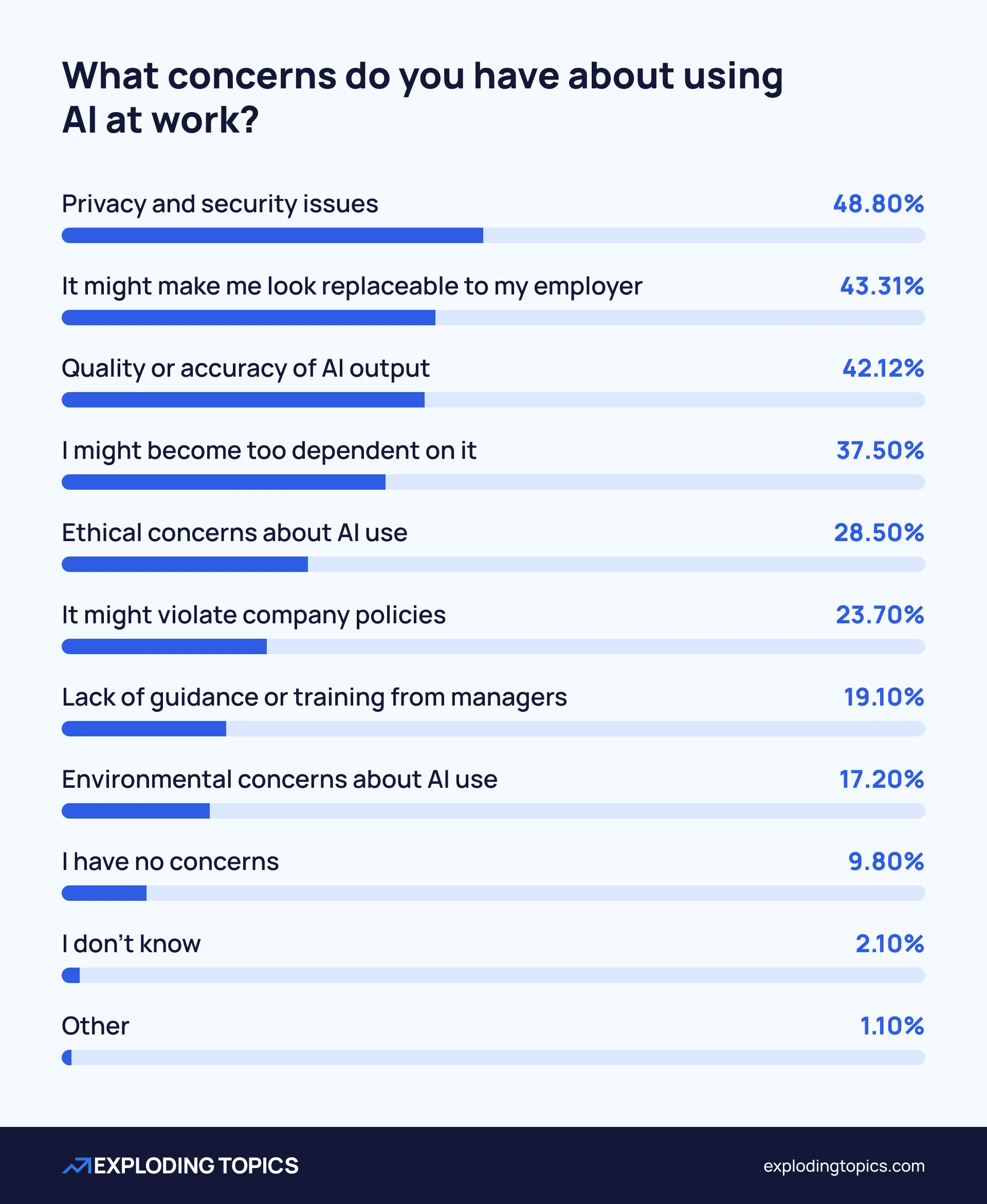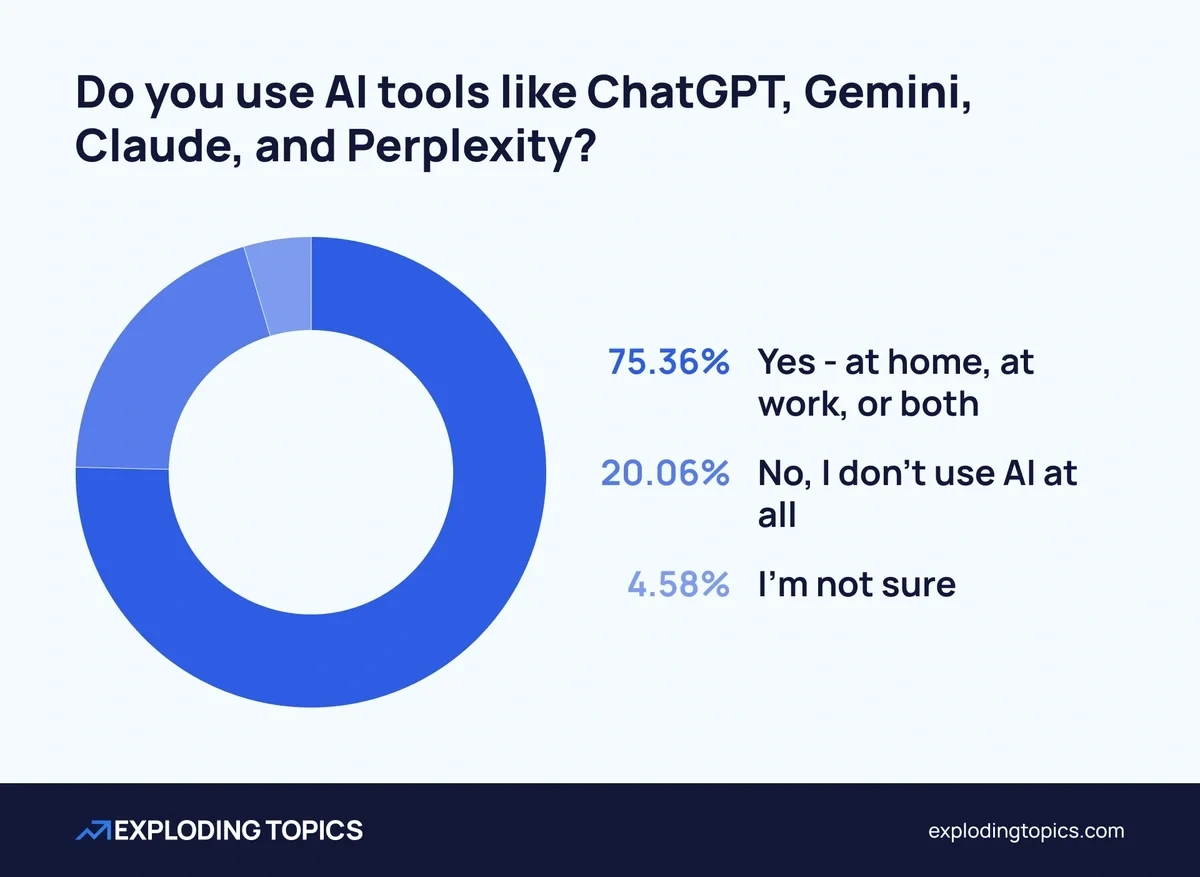Get Advanced Insights on Any Topic
Discover Trends 12+ Months Before Everyone Else
How We Find Trends Before They Take Off
Exploding Topics’ advanced algorithm monitors millions of unstructured data points to spot trends early on.

Keyword Research
Performance Tracking
Competitor Intelligence
Fix Your Site’s SEO Issues in 30 Seconds
Find technical issues blocking search visibility. Get prioritized, actionable fixes in seconds.
Powered by data from
AI in Hospitality: Opportunities, Fears, and Trends (2025)
Artificial intelligence (AI) is gaining traction in the hospitality sector. Nearly 2,000 people search this topic online every month, and interest in the tech has skyrocketed in 2025. Right now:
- Business owners are interested in leveraging AI-powered tech to boost sales and serve customers
- Marketers want to automate and analyze data more efficiently
- Human resources teams are exploring how to improve hiring and onboarding
- Investors are watching to see how AI might optimize revenues and create new industry segments
This overview will give you the key details you need to know about AI integrations and their impact on the hospitality sector.
Key Insights About AI in Hospitality
- Our research shows that 30% of people are already using AI to plan trips
- A report in the Wall Street Journal indicates that 40% of people book hotels based on AI recommendations
- Large travel companies like Delta Airlines are exploring how to use AI for dynamic pricing models
- More than one-third of people are “very” or “somewhat” comfortable sharing their personal details with AI tools
AI in Hospitality: Top Use Cases
Generative AI (like ChatGPT) and more traditional forms of machine learning are useful across the hospitality sector.
Uses of the tech can range from marketing hotel deals at the right time to tailoring a dinner experience so that it matches a guest’s preferences or dietary restrictions.
Customer Service
The natural language processing (NLP) found in many generative AI tools means that it’s entirely possible to incorporate AI into customer service.
While the predictive and sometimes limited nature of a generative AI conversation means that chatbots can’t handle every guest services task, this technology is ideal for creating:
- Virtual concierge services that can guide guests to local hot spots or assist in making reservations
- Always-on support chats that answer guests’ questions before booking, during their stay, and after checkout
- Real-time facial recognition and ID verification systems that let guests check in on their own at any time of the day or night
AI can even enhance customer service conversations between two people. Real-time translation technology means that foreign guests and on-site hotel staff can communicate seamlessly, with each party speaking their preferred tongue.
For example, in the hotel industry, this translation could happen:
- Through speakers placed on the front desk
- Via a dedicated phone application for guests
- With wearable devices provided to guests during the duration of their stay
Interest in AI-powered real-time translation has grown by over 600% in the past year alone, and a report from the University of Milan Biocca indicates that more than 40% of travelers are already using Google Translate or ChatGPT to do voice translation on their own.
Offering this service seamlessly to your guests at check-in can add an extra level of personalization and value to the customer experience.
Personalized Guest Experiences
The ability to seamlessly begin real-time translation for a guest, though, depends in part on how much you know about them. Hotels, restaurants, and other hospitality businesses that collect guest data can now use AI to turn information into experiences.
This can include:
- Automatically setting in-room temperature and lighting levels to match a hotel guest’s needs and preferences
- Offering guests discounts on specific activities or experiences based on their previous stays
- Personalizing loyalty programs to boost rewards for the purchases and services that a traveler values the most
- Offering custom day trip itineraries that align with a hotel guest’s interests and predicted budget
- Giving restaurant and room service diners menus tailored to their dietary needs
Marketing
Personalization bleeds into the hospitality marketing world, too. The technology is useful for:
- Better analysis of customer sentiment after they check out or finish dining, and using that information to personalize their next visit
- Evaluating patterns in a customer’s purchase and booking data to send retargeted marketing campaigns at just the right time
- Segmenting prior guests by interest, budget, and more so they’re sure to receive accurately targeted communications
While some of this work has been happening for years without AI, incorporating the technology into routine tasks can make the marketing workload easier and more efficient.
AI technology is also useful for non-personalized marketing efforts. For example:
- The Kimpton Gray Hotel in Chicago uses virtual reality to offer prospective guests immersive tours of the property
- Marriott Homes and Villas offers a natural-language AI search tool that pairs vacationers with their ideal property
AI-driven marketing doesn’t have to always be customer facing, either. Hospitality marketers can leverage AI technology to make sure their businesses are appearing in the AI tools that potential clients use.
More than 40% of travelers already book hotels based on AI recommendations, so hospitality companies need to know where they stand in AI search results. Platforms like the Semrush AI Visibility Toolkit and Semrush Enterprise AIO use AI to show businesses vital marketing info that includes:
- Market share graphs that show you which competitors are dominating AI search results
- Sentiment analysis that covers how different chat tools present your brand, and whether responses tend to skew positive or negative
- Query lists that identify which prompts return results about your hospitality business
By pairing these AI tools with your existing SEO and customer or guest satisfaction metrics, you can get a better understanding of how you’re found and being represented online.
Get More Search Traffic
Use trending keywords to create content your audience craves.
Business and Facility Management
AI can also help you manage your hospitality business and improve operational efficiency. While you might think of AI equaling something like a food delivery robot, AI systems are often more subtle. For instance:
- A hotelier may use predictive analytics to forecast how many housekeepers they’ll need to have scheduled during a busy holiday weekend
- A restaurant can use AI-powered, internet of things (IoT) thermostats to adjust temperature based on indoor occupancy and outdoor temperatures
- An airline may use AI to track equipment use and predict maintenance intervals
- A busy bar may use tools like Airloom AI, which enables natural language search of security footage
Many companies — from fast-food restaurants to Delta Airlines — are exploring how to use AI for dynamic pricing strategies, too. Dynamic pricing models use AI to analyze aggregate data about things like:
- Customer demand
- Market shifts
- Weather patterns
- Competitor activity
Businesses can then use this data to make subtle shifts in their pricing to both encourage sales and boost revenue.
Challenges and Obstacles When Using AI in Hospitality
Using AI at your hospitality business isn’t without potential hiccups, though. As much as you may want to streamline operations, it’s important to evaluate:
- Which processes or repetitive tasks can best benefit from the inclusion of AI?
- Would a generative AI chat tool or a specific, purpose-built AI or machine learning tool work better?
- Will the cost of the AI tool potentially exceed the amount of money you’d save by using it?
- How can you protect your customers’ data and information when using AI to offer personalized services?
It’s also important to consider who within your company will be using AI tools, and how.
If you want your staff to use AI, you may need to overcome some resistance.
A recent Exploding Topics report about AI in the workplace found that 48.5% of employees are concerned about the privacy and security of AI tools at work, and 43.31% are worried that if they use AI at work, they’ll appear more replaceable.
And remember, your employees might not be familiar with how a general-purpose AI tool works. Just over 20% of people we surveyed have never used AI at all.
You can make the transition to an AI-enabled workplace easier by providing training to every employee and opting for specialized, data-driven AI tools (like Semrush’s AI Visibility Toolkit) that serve a specific function within your operations.
The Future of AI in the Hospitality Industry
Many current AI users are already comfortable, and happy, with the technology. Nearly 30% of people we surveyed like using AI to plan trips, and tools like ChatGPT continue to grow in popularity for personal use.
Use of AI technology in the hospitality industry may increase as more people are exposed to the tech through personal use. This can then spark ideas for ways to use AI for hotel management, revenue optimization, and more.
If you’re already interested in bringing AI into your operations but aren’t sure how, marketing is a great place to start. The Semrush AI Visibility toolkit contains everything you need to understand how your company can better use AI and be represented in AI search results.
Plus, with access to the entire Semrush platform, you can:
- Dig deeper into your competitors’ strategies
- Write catchy website content with AI
- Make sure your business appears correctly across all web and map listings
Grab our exclusive coupon code to get a 14-day free Semrush trial and explore everything that the platform has to offer.
Stop Guessing, Start Growing 🚀
Use real-time topic data to create content that resonates and brings results.
Exploding Topics is owned by Semrush. Our mission is to provide accurate data and expert insights on emerging trends. Unless otherwise noted, this page’s content was written by either an employee or a paid contractor of Semrush Inc.
Share
Newsletter Signup
By clicking “Subscribe” you agree to Semrush Privacy Policy and consent to Semrush using your contact data for newsletter purposes
Written By


Emily is a freelance content writer at Exploding Topics. A former news correspondent, she has over 15 years' experience creati... Read more




